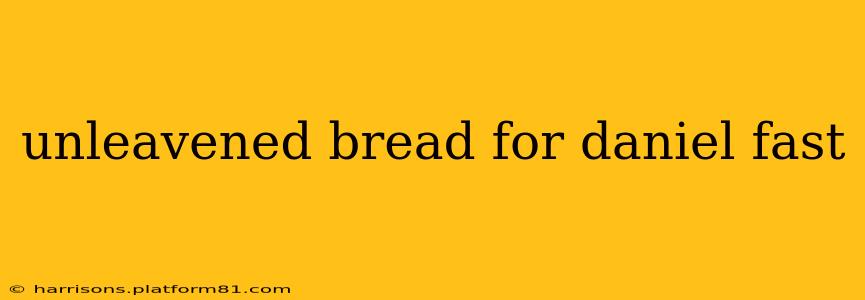The Daniel Fast, a spiritual practice involving abstaining from certain foods, often leaves people questioning permissible ingredients. One common query revolves around unleavened bread: Is unleavened bread allowed on the Daniel Fast? The answer, while seemingly simple, requires a nuanced understanding of the fast's principles and the varying interpretations surrounding it.
This guide will delve into the specifics of unleavened bread, exploring its ingredients, variations, and suitability within the context of the Daniel Fast. We'll also address common concerns and provide practical advice to help you navigate this aspect of your spiritual journey.
What is Unleavened Bread?
Unleavened bread, also known as matzah, is bread made without any leavening agents like yeast, baking powder, or baking soda. This results in a flat, cracker-like bread. Traditionally, it's made from just flour and water, although some modern variations might include minimal additions like salt or oil. The absence of leavening agents is crucial to its definition.
Is Unleavened Bread Allowed on the Daniel Fast?
The core principle of the Daniel Fast is to abstain from processed foods, sweets, leavened bread, and meat. This focuses on a diet primarily composed of fruits, vegetables, legumes, whole grains, and water. Therefore, plain, simple unleavened bread, made solely from flour and water (or minimally with salt), is generally considered acceptable. However, the interpretation can vary depending on individual beliefs and the specific guidelines followed.
Some individuals interpret the "no leavened bread" clause strictly, leading them to avoid all types of bread, including unleavened varieties. Others focus on the spirit of the fast, avoiding highly processed foods and refined grains, making simple unleavened bread a permissible choice.
What are the Different Types of Unleavened Bread?
Several types of unleavened bread exist, each with varying levels of adherence to the Daniel Fast guidelines:
1. Traditional Matzah:
This is the most basic form, usually consisting of only flour and water. It aligns perfectly with the principles of the Daniel Fast for its simplicity and lack of additives.
2. Flavored Matzah:
Some matzah varieties include added ingredients like herbs or spices. While still unleavened, these additions might be considered processed depending on your personal interpretation of the fast's guidelines. It's best to choose plain matzah for a more conservative approach.
3. Multigrain Matzah:
This type utilizes different flours besides wheat, potentially introducing ingredients that some individuals may wish to avoid during the Daniel Fast. Consider the source and composition carefully.
4. Commercial Matzah with Added Oils or Sugars:
These variants should be avoided as they introduce processed ingredients against the principles of the Daniel Fast.
What about Additives in Unleavened Bread?
Even in seemingly simple unleavened bread, you might find trace amounts of additives like emulsifiers or preservatives. Checking the ingredient list is vital. Choose brands known for minimal processing and natural ingredients.
How to Incorporate Unleavened Bread into Your Daniel Fast
If you choose to include unleavened bread, remember moderation is key. Treat it as a supplement to your diet, emphasizing fruits, vegetables, and other whole foods that are integral to the Daniel Fast.
Frequently Asked Questions (FAQs)
Is it okay to toast unleavened bread during the Daniel Fast?
Toasting unleavened bread doesn’t inherently violate the Daniel Fast. However, adding oil or butter during toasting should be avoided.
Can I use unleavened bread to make other foods during the Daniel Fast?
Using unleavened bread to make more complex dishes might be considered pushing the boundaries of the fast, depending on your interpretation. Stick to consuming it plain.
Are there healthier alternatives to unleavened bread during the Daniel Fast?
Other whole grains like quinoa or brown rice can serve as healthy alternatives providing similar nutritional value.
The Daniel Fast is a personal journey of spiritual discipline. The decision of whether to include unleavened bread should align with your individual understanding of the fast's guidelines and your personal commitment to its principles. This guide provides information to help you make an informed decision that respects both your spiritual goals and your dietary needs. Remember to always consult with your healthcare provider before making significant dietary changes.
